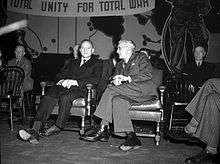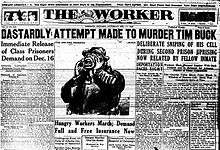Tim Buck

Timothy "Tim" Buck (January 6, 1891 – March 11, 1973) was a long-time general secretary of the Communist Party of Canada (known from the 1940s until the late 1950s as the Labor-Progressive Party) from 1929 until 1962. Together with Ernst Thälmann of Germany, Maurice Thorez of France, Palmiro Togliatti of Italy, Earl Browder of the United States, and Harry Pollitt of Britain, Buck was one of the top leaders of the Joseph Stalin-era Communist International.
Early life and career
A machinist by trade, Buck was born in Beccles, England and emigrated to Canada in 1910 reputedly because it was cheaper to book steamship passage to Canada than to Australia. He became involved in the labour movement and joined the International Association of Machinists and radical working class politics in Toronto. In 1921, he participated in the founding convention of the Communist Party of Canada. Not initially a leading member of the party, Buck came to prominence as a supporter of Joseph Stalin, and became General Secretary in 1929 after the old party leadership had been purged for supporting Trotsky and others had been removed for supporting Bukharin. Buck remained General Secretary until 1962, and was an unquestioning supporter of the Soviet line throughout his tenure.
National figure

In 1928, Buck was expelled from the International Association of Machinists for being a member of the Communist Party of Canada.[1] With the onset of the Great Depression, the Conservative government of R. B. Bennett became increasingly worried about left-wing activity and agitation. On August 11, 1931, the Communist Party offices in Toronto were raided, and Buck and several of his colleagues were arrested and charged with sedition. Buck was tried in November, convicted of sedition and sentenced to hard labour.
He was imprisoned from 1932 to 1934 in Kingston Penitentiary where he was the target of an apparent assassination attempt in his cell the night after a prison riot. While Buck was sitting in his cell listening to the mêlée outside, eight shots were fired into his cell via a window, narrowly missing the prisoner.[2] In late 1933, Minister of Justice Hugh Guthrie admitted in the Canadian House of Commons that shots had been deliberately fired into Buck's cell, but "just to frighten him". A widespread civil rights campaign ultimately secured Buck's release. His extensive testimony before the Archambault Commission contributed to the reform of prisons in Canada. As a result, Buck was hailed a heroic champion of civil liberties.
The Communist Party was banned in 1941 under the Defence of Canada Regulations and Buck and other prominent Communist leaders were forced underground and ultimately into exile in the United States. The political environment changed with the German invasion of the USSR and the Soviet Union's entry into World War II on the side of the Allies. As a result, Canadian Communists ended their opposition to the war and became enthusiastic supporters of the Canadian war effort. The party supported the government's call for conscription and established Tim Buck Plebiscite Committees which called for a "Yes" vote in the 1942 national plebiscite on conscription. The campaigning in support of the war helped change public opinion towards the Communists and resulted in the government's release of Communist leaders being held in detention and the return of Buck and other leaders from exile. While the ban on the party itself was not lifted it was allowed to organize the Labor-Progressive Party as a legal public face.
Electoral politics
Buck ran for a seat in the House of Commons on six occasions. He won 25% of the vote, placing third, when he ran in Winnipeg North in the 1935 federal election. He lost to Cooperative Commonwealth Federation (CCF) candidate Abraham Albert Heaps. In the 1937 Toronto municipal election he came within 200 votes of winning a city-wide election to the Toronto Board of Control. He won 26% of the vote when he ran in the Toronto riding of Trinity in the 1945 election, and 21% in the 1949 election, finishing ahead of the CCF on both occasions. In the 1953 election, he won only 8.7% of the vote and then just 3.7% of the vote when he stood one last time in the 1958 election.
Retirement and death
Buck retired as general secretary of the Communist Party of Canada in 1962, but remained in the largely ceremonial position of party chairman until his death in 1973. There was controversy within the party when a posthumous version of his memoirs was published in 1977 by NC Press based on interviews conducted for the CBC in 1965. In Yours in the Struggle: Reminiscences of Tim Buck, the former party leader criticized Nikita Khrushchev and was somewhat defensive of Stalin, although not departing from the international Communist movement's current perspective.
The main concerns of the party was the claim that the publishers were trying to frame Buck in a pro-Maoist manner, in regards to the Sino-Soviet Split where the party had sided with the Soviet Union, and that the loose recordings were in a position to be easily misinterpreted. Those within the Central Committee responsible for its publication were punished for "grave violation of democratic centralism".[3] Earlier in 1975, Progress Books published Tim Buck — A Conscience for Canada by Oscar Ryan, which is considered to be the party-approved biography. In it, Buck was quoted as saying "for a time I gave the appearance of defending Stalin. I didn't defend what he had done; the fact is, nobody could defend the things that Khrushchev revealed."
Canadian Trotskyist Ian Angus also criticized Yours in Struggle with regards to accusations that Buck had stated misinformation with regards to the purging of alternate voices during his early rise in the party.[4] He continued this criticism with his 1981 book Canadian Bolsheviks: The Early Years of the Communist Party of Canada, which analyzed the formation and rise of the party, but felt that Tim Buck had betrayed it by promoting himself and a strongly pro-Soviet line.[5]
See also
References
- ↑ Rodney, William. Soldiers Of The International; A History of the Communist Party of Canada, 1919-1929. Victoria, British Columbia. University of Toronto Press (1968) P.137
- ↑ The Worker vol.11 Number 523,Saturday December 17, 1932, see image above
- ↑ The CPC Condemns Publication of Tim Buck's Reminiscences, Communist Party of Canada, 1977, Marxists Internet Archive
- ↑ Yours in the Struggle: Reminiscences of Tim Buck - Reviewed by Ian Angus, May 1979, Marxists Internet Archive
- ↑ Announcing the Second Edition of Canadian Bolsheviks: The Early Years of the Communist Party of Canada By Ian Angus, Marxists Internet Archive
External links
| Wikiquote has quotations related to: Tim Buck |
- Progress Books Online Contains PDF versions of Put Monopoly Under Control and Canada and the Russian Revolution by Tim Buck
- Tim Buck, Too by Morris Wolfe on Tim Buck's 1931 trial.
- Tim Buck Internet Archive
- "Audacity, audacity, still more audacity": Tim Buck, the Party, and the People, 1932–1939 by John Manley
- Tim Buck: Canada's Communist